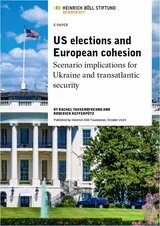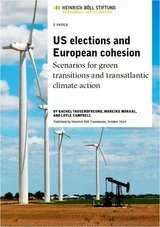The victory of Donald Trump in the 2024 US elections will undoubtedly have consequences in transatlantic relations, from foreign and security policy to green transition and competitiveness. We asked 3 questions on the consequences of Trump 2.0 for Europe to German Green MEP Sergey Lagodinsky, who is a member of the EP Delegation for relations with the United States.

What are the main implications of Trump's victory for Europe, and how should the EU react?
Trump's victory means first and foremost for the EU that it needs to stand united, rethink its security and defence strategies, and step up as the primary advocate for liberal democratic values.
His victory has sparked enthusiasm in some countries, including within the EU, where certain leaders may now feel encouraged to assert their opposition to EU mainstream policies. In response, Europe needs to come together more firmly than ever, presenting a united front on key issues, from regional security, digital innovation to climate action and democratic values.
With the new US administration comes uncertainty regarding future US support for Ukraine. We need to react to this new situation twofold by building constructive working relationships with the new US administration and continuous close cooperation, while simultaneously continuing to advance Europe’s own security and defence independence.
Last but not least, Europe must step forward as the primary advocate for liberal democratic values and climate action. This includes deepening collaboration with US states, cities, and a vibrant civil society, fostering alliances within the United States that share Europe’s commitment to these causes, while also seeking broader alliances beyond the United States.
We are not starting from scratch, but we need to elevate our efforts in assuming global leadership in climate policy, women’s rights, minority protection, and the defence of liberal-democratic values. For this, we need a renewed European unity, both externally and internally.
What do you expect for the future of NATO and of support to Ukraine?
Trump’s election raises serious questions not only about future US support for Ukraine but also about the future of NATO. This situation and discussion aren’t new—Trump’s first presidency served as a wake-up call for Europe. While we are not there yet, we are on a clear path to accelerating our own defence investments and strengthening the EU’s capacity to support Ukraine and ensure regional stability. But there is no more time to lose; we need to step up our pace.
The EU must now take on a decisive role regarding NATO and the support of Ukraine. It is up to us to help define NATO’s role going forward. President Zelenskyy’s vision underscores that NATO membership and comprehensive military support are essential to Ukraine’s security. Let’s build on this. Ukraine’s security is also our security in the EU—a point we cannot emphasize strongly enough.
If we are serious about our commitment to Ukraine, the EU and NATO must commit to providing reliable, substantial security guarantees. Moving beyond limited assistance toward a well-defined security framework, NATO and the EU can pave the way toward a balanced and sustainable path to peace. A proactive European stance—focused on defence readiness and steadfast support for Ukraine—will be essential as we adjust to new dynamics under the new US administration.
Are Europe's plans suited for the global competition model that Trump has promised?
Trump’s expected “America first” policies certainly provide a challenge to the EU and international trade in general.
Higher tariffs on European goods could make exports less competitive in the US market, and a renewed emphasis on US-China tensions may pressure Europe to reduce trade with China, a crucial partner. In response, the EU should accelerate plans to strengthen internal trade, diversify our global partnerships, and boost resilience by reducing reliance on US and Chinese supply chains, especially but not limited to the field of digital infrastructure.
Trump’s likely rollback of environmental commitments, including a potential renewed withdrawal from the Paris Agreement, may test the EU’s green ambitions. However, it also opens a space for the EU to reinforce our role as a leader in climate action. By deepening alliances with other committed partners, such as Canada and Japan, we should aim to advance green policies globally, attracting investments in renewable sectors.
Looking ahead, Europe’s best response is to focus on our strengths: leading in climate innovation, strengthening intra-EU trade, expanding innovation and fostering partnerships with countries aligned with our values. This proactive stance can position the EU as a stabilizing force in a divided global landscape, showing resilience and adaptability in an era of intensified competition.
The views and opinions in this article do not necessarily reflect those of the Heinrich-Böll-Stiftung European Union.


